Does Titanium Jewelry Tarnish? Everything You Need to Know About …

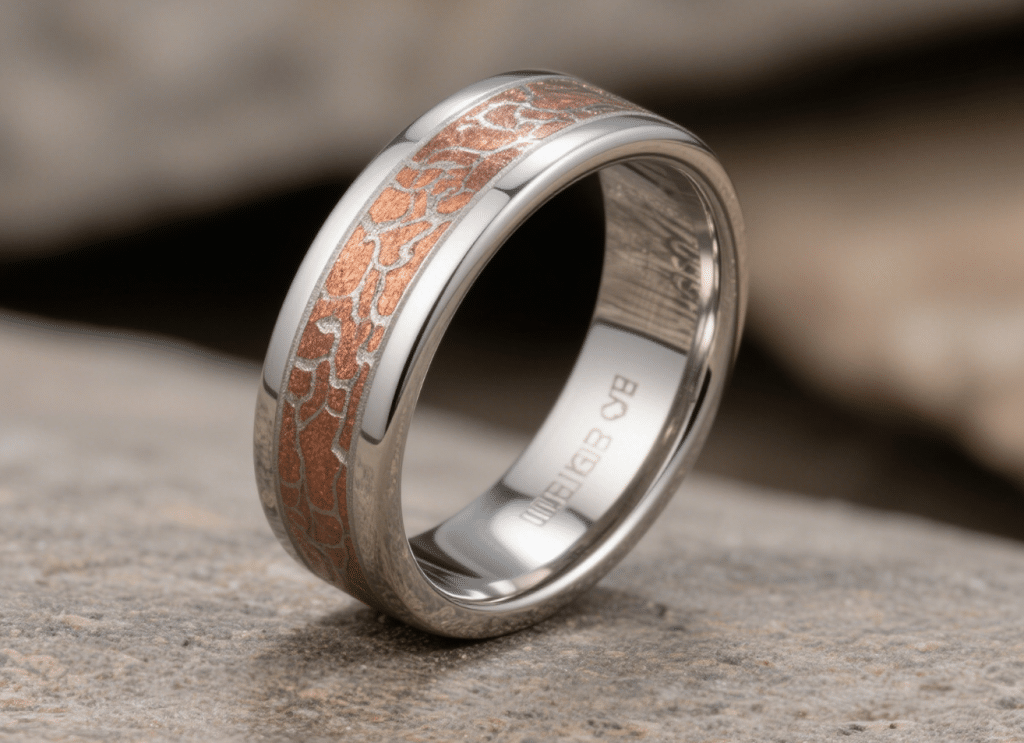
Titanium jewelry does not tarnish under normal use. The metal develops a robust layer on its surface that effectively blocks rust and stains. If you’re wondering, ‘does titanium jewelry tarnish?’ the answer is no. This property makes it an excellent choice for anyone looking for durable jewelry. I create jewelry from many metals, but titanium stands out due to its unique properties.
This stable oxide layer protects the jewelry and prevents tarnishing over time.
Even in soap, sweat, or saltwater, you’ll notice that titanium won’t change color or dull. There’s no need to buffer it regularly or expose it to severe detergent products. For anyone looking for a low-maintenance alternative that never needs to be polished or cleaned, titanium is the perfect choice.
Read on to find out what makes titanium such a powerful tool. Here’s how to care for it and keep it in pristine condition!
What Makes Titanium Unique?
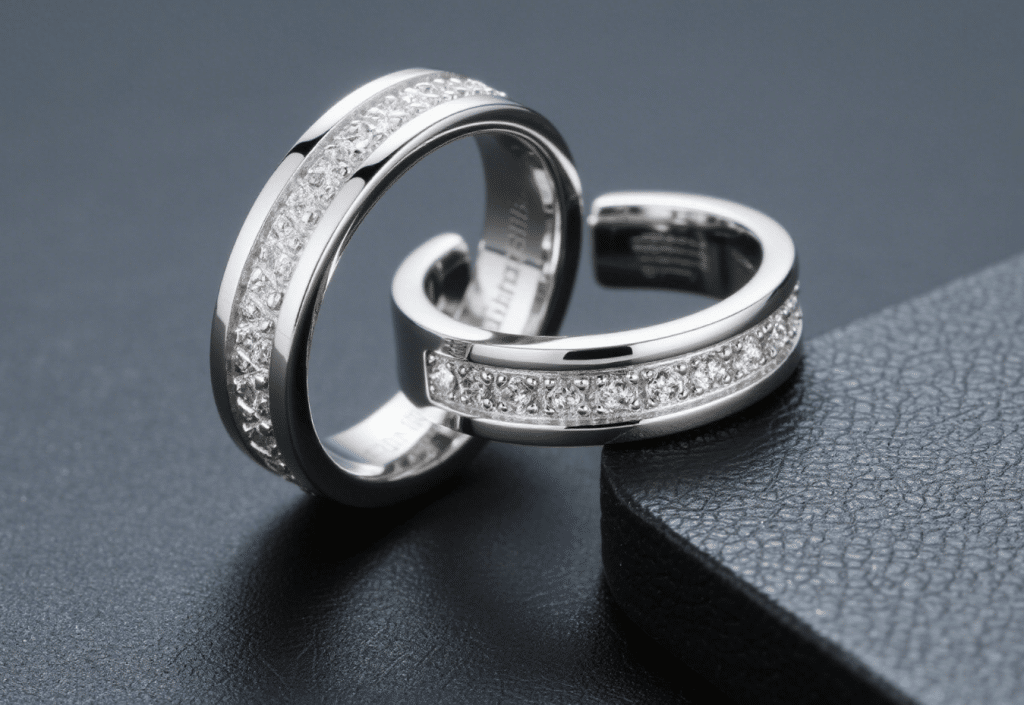
There are many reasons why titanium is a great selection for fine jewelry. Its tensile strength, extreme lightness, and clean sleek look underpin contemporary style to a tee. From aerospace to medicine, you can see this extraordinary metal all around you.
In jewelry, its magical mix of qualities offers an aesthetic beauty and strength for a lifetime of wear. Each titanium piece gleams with a natural silver-white sheen that provides a crisp, bright aesthetic and luster that lasts for years. When exposed to air and water, a surface titanium forms a thin oxide layer that protects the metal from oxidation.
This corrosion barrier provides excellent protection against tarnish or rust. With HonHo Jewelry, that means your rings, necklaces, or bracelets retain that brand new shine, even after everyday wear.
Defining This Strong Metal
Read on to discover what makes titanium such a powerful tool for jewelry. Here’s how to care for it and keep it in pristine condition!
Engineers love this quality, and it has a significant role in jewelry. The nonferrous group includes metals like aluminum, copper, nickel and titanium that do not rust or corrode in the same way iron does. That makes every single piece incredibly durable, even in the stickiest, saltiest, doggiest atmosphere!
Titanium is incredibly lightweight—only one-third the weight of gold—so rings and bracelets feel wonderfully light while still holding up against bending or breaking. Its strength allows jewelers to craft intricate, delicate designs that last throughout the ages.
Since titanium is hypoallergenic, it’s safe for even the most sensitive skin. It is very hard, with a Mohs hardness of 6, much harder than gold or silver. Jewelry made from titanium can withstand dings, falls, and daily wear without losing its form. It might even be the only material in the world that can fully resist corrosion from saltwater or sweat.
It might even be the only material in the world able to fully withstand saltwater or sweat without corroding or discoloring.
Lightweight Yet Durable Feel
Understanding whether or not titanium jewelry tarnishes is essential for anyone looking to invest in long-lasting accessories.
For those unsure about the durability and maintenance of their accessories, understanding whether or not does titanium jewelry tarnish can significantly impact your decision.
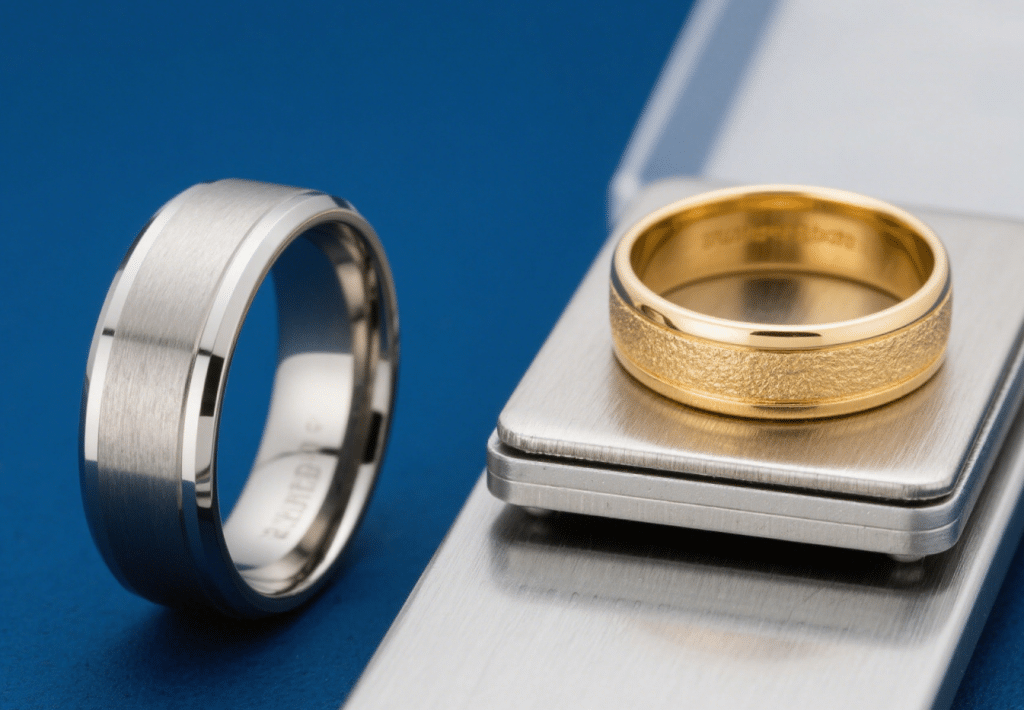
Titanium is only one-third the weight of gold, so rings and bracelets feel wonderfully light while still resisting bending or breaking. Its strength allows jewelers to craft intricate, delicate designs that last throughout the ages.
You’re treated to unrivaled comfort for all day wear along with the style and durability you’ve come to expect.
Understanding Metal Tarnish
Does Titanium Jewelry Tarnish?
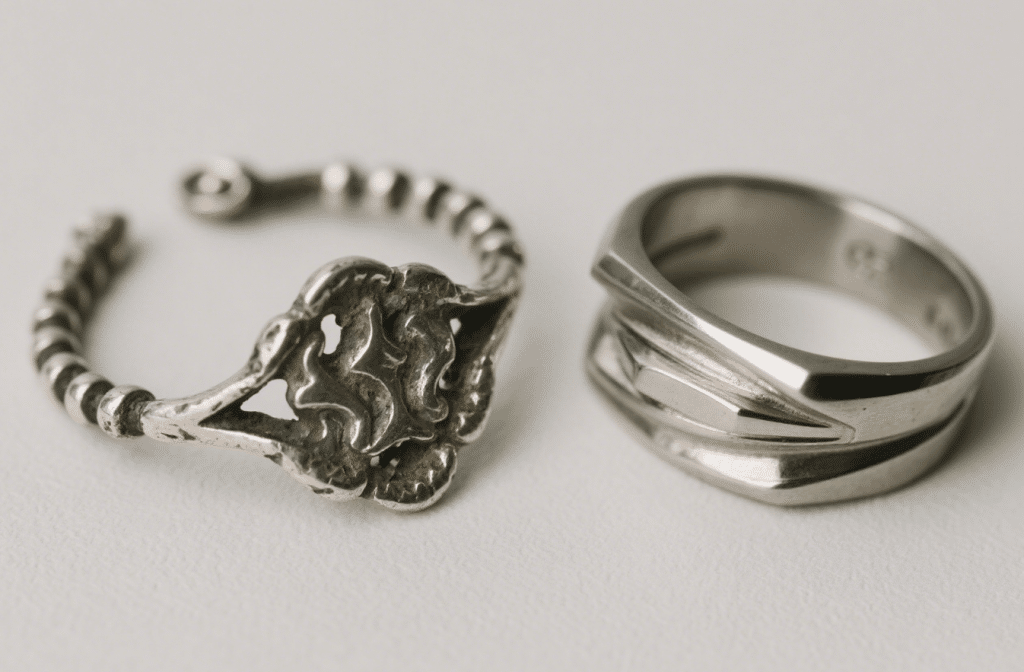
Metal tarnish is what makes a new piece of jewelry look old and dirty. Rather, it reacts chemically and instead turns a uniform gray or black color. This is especially true with metals that naturally react with oxygen and other environmental factors or have a tendency to corrode from skin contact.
Eventually, this unappealing coating thickens, covering the metal’s shiny appearance. Understanding what causes metal tarnish is essential to keeping your jewelry looking its best and lasting many years to come.
What Causes Tarnish?
Therefore, tarnish will develop on jewelry when it comes in contact with air, water, and sweat. When moisture and air combine, it sets off reactions that are most pronounced in metals like silver. Alloyed silver reacts with sulfur in the air, usually linked to industrial pollution but sometimes from one’s diet, to form silver sulfide.
This is what produces the familiar gray humungous of silver, that dark, smudgy appearance. Metals exposed in very humid, salty, or polluted areas tarnish more quickly. What makes titanium really unique from the rest is the fact that it doesn’t rust/tarnish when exposed to moisture/chemicals.
Its thin oxide film—titanium dioxide—not only gives titanium beautiful color but prevents metallic corrosion, blocking oxygen and moisture from initiating any tarnish.
Why Some Metals Discolor
The recipe of metals, or alloy, matters as well. Sterling silver is softer and more prone to tarnish. On the other hand, titanium, which is a 6 on the Mohs scale and has a tensile strength of almost 63,000 psi, is fantastic at withstanding wear and tear.
Even if the oxide layer were to be scuffed, it redevelops quickly upon contact with oxygen.
Tarnish vs. Corrosion Explained
Tarnish refers to only an outer layer of the metal forming a luster-depleting color, while corrosion conveys a deeper decay of the metal itself. Uncontrolled corrosion will destroy your jewelry and create pits or cracks.
Titanium’s fast-forming oxide barrier prevents tarnish and corrosion, even in salt or sweat. This quality makes it a wise choice for jewelry you put on constantly.
Does Titanium Jewelry Tarnish?
Most people assume that titanium jewelry, with its corrosion resistance, will never tarnish, but that’s only half the tale.
Why you don’t need to worry about rust and stains
Titanium is absolutely amazing when it comes to rust and stains. Though resistant, as with any metal, it is impacted when the environment turns hostile. The key is daily wear and tear as well as the general care you give to your jewelry.
If you are a swimmer, work outdoors, or sweat a great deal, your jewelry will be subjected to increased strain. Pure titanium does not tarnish. You may find small scratches or a lackluster appearance after wear.
1. The Science: Titanium’s Oxide Layer
Titanium creates an ultra-thin, clear film known as oxide when exposed to air. This layer does a great job of keeping water, sweat, and even salt from getting to the metal beneath it.
It doesn’t rust, so its surface is maintained and no dull spotting or discoloration will occur. As this layer thickens, the aromatic layer can alter the color somewhat, though it continues to protect the metal.
2. Unpacking Titanium’s Tarnish Resistance
It resists the wear and tear that affects other metals like silver or steel. Its resistance to corrosion goes indefinitely, meaning your ring or necklace retains its appearance.
Pure titanium, as in the 99.2% grade, is less prone to dullness or staining.
3. Real-World Proof: Does It Hold Up?
Customers who wear titanium from manufacturers such as HonHo Jewelry report that their titanium jewelry remains shiny even after years of daily wear.
Even with daily wear, scratches appear long before any actual tarnish does.
4. Extreme Conditions: Any Exceptions?
Saltwater or chlorine may leave faint traces if you do not rinse your titanium jewelry regularly. Harsh chemicals could further damage the surface, but rust will never occur due to its corrosion resistance.
5. Anodized Titanium: Color Fading vs. Tarnish
Anodized titanium jewellery can lose color from excessive hand-washing or cleaning, but it will not tarnish like sterling silver.
6. Comparing Resistance: Titanium vs. Others
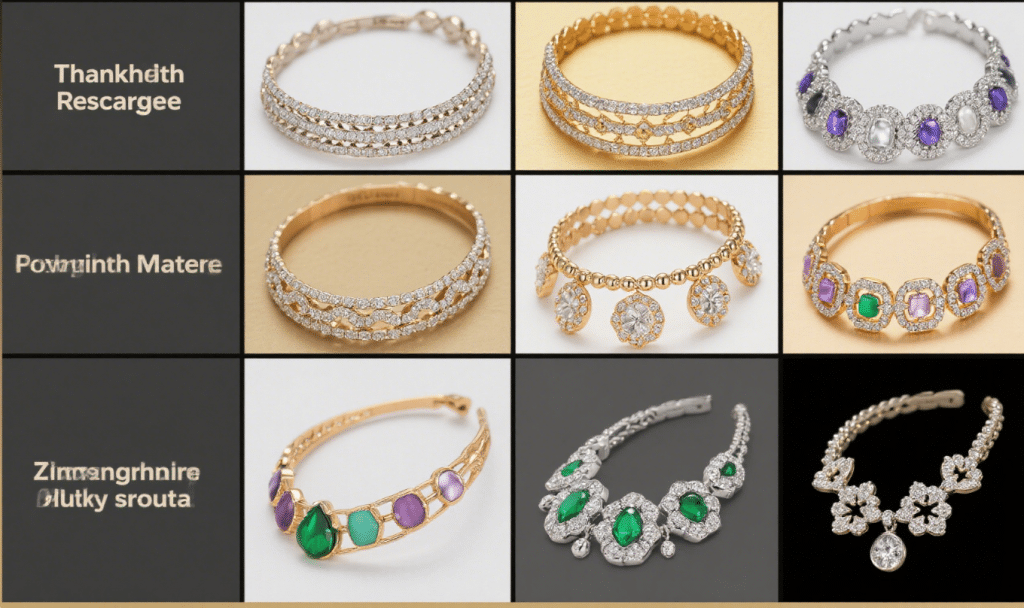
|
Metal |
Tarnish Resistance |
Maintenance |
Durability |
|---|---|---|---|
|
Titanium |
High |
Low |
Very Strong |
|
Stainless Steel |
Good |
Low |
Strong |
|
Silver |
Low |
High |
Soft |
So titanium jewellery really is the ideal choice for those looking for hassle-free wear that lasts.
7. Skin Contact and Body Chemistry
Sweat and natural oils from your skin won’t affect titanium jewellery at all. Its corrosion resistance and hypoallergenic properties make it a safe and durable option for all wearers.
8. Environmental Factors Impact
While humidity or pollution can accelerate tarnish on softer metals, titanium remains impervious.
Keeping your jewelry stored in a dry, clean area can help prevent any dirt or grime from accumulating.
Factors That Change Titanium’s Look
Titanium jewelry is well known for its incredible durability and modern look. It remains beautiful long after the wedding, but just like any other art piece, it can develop a history over time. You end up with a material that can claim strength three to four times that of stainless steel.
This unparalleled durability ensures it shines through its everyday wear like no other metal. Additionally, it’s a good deal lighter, about 40 to 45 percent lighter than steel. Titanium comes in grades—commercially pure or as alloys like Grade 5, which mixes titanium with aluminum and vanadium for extra strength.
This is because the metal rusts less easily than its counterparts, iron or steel. Additionally, over time and with continued use, all materials develop patina and wear.
Scratches and Surface Wear
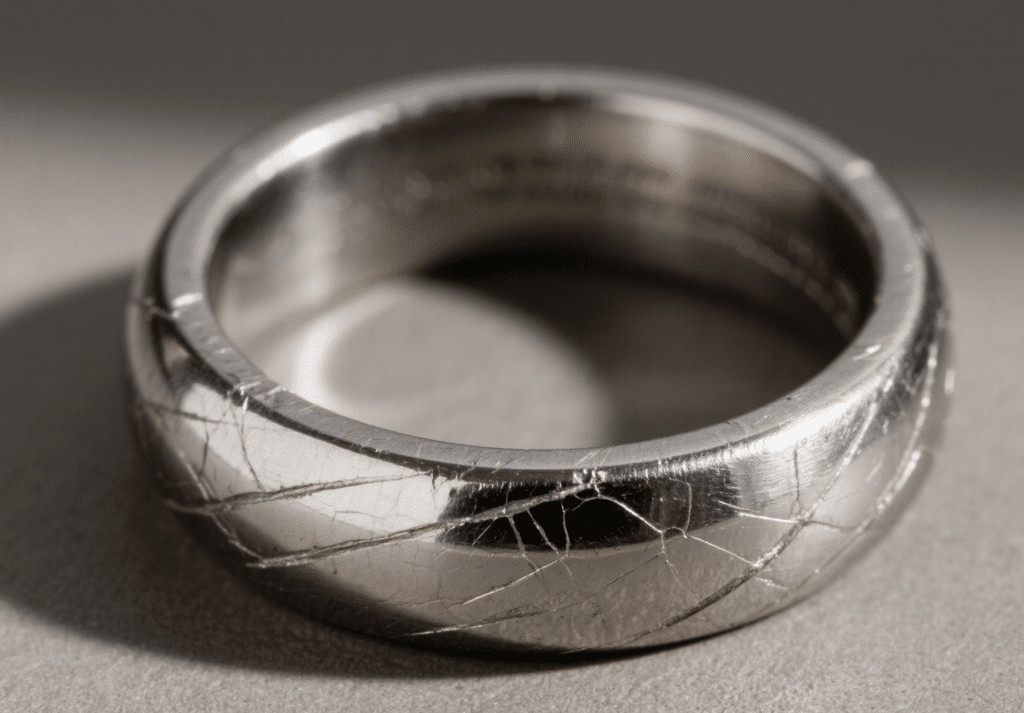
While titanium is a very scratch-resistant metal, scratches can dull the shine of titanium jewelry. You may develop minor scratches or scuff marks, particularly if you wear rings or bracelets daily. These marks are more noticeable on polished pieces than on items finished with a matte or brush texture.
Gentle care with soft cloths and storing your pieces away from other metal objects can go a long way to reduce new scratches created. Simple maintenance, including light cleaning and a soft polishing with a cloth, will help preserve the surface appearance.
Heat Exposure Effects
Heat can affect the surface of titanium and its appearance. Although this particular metal holds up better than most, extreme high temperatures can lead to shifting colors or erosion of the surface.
As a rule of thumb, it’s best to avoid direct contact with flames, saunas, or hot tools while wearing your jewelry. Restricting exposure to high heat preserves the inherent color and character of every work.
Chemical Reactions to Avoid
Household cleaners, bleach, and abrasive detergents make an unnecessary assault on titanium. Though titanium may be impervious to rust, the application of harsh chemicals often can still stain or alter the surface finish.
It is generally safer to remove your jewelry before coming into contact with these chemicals. Avoid abrasive cleaners that would scratch the surface, use mild soap and water instead.
Anodized Color Durability
Anodized titanium rings or pendants introduce vibrant color, but this finish may wear or change over time. Environmental factors like friction, sweat, and sunlight factor in.
Just keeping these pieces nice and dry, not in strong light, definitely helps. HonHo Jewelry specializes in designing and making quality fashion jewelry for long time wearing if properly cared for as recommended.
How To Clean Titanium Jewelry
Enjoy the modern, contemporary look of titanium jewelry and its incredible durability, making it a perfect option for everyday wear. With just a bit of simple care, you can keep your jewelry pieces shining much longer. Regular polishing of your titanium items is crucial to maintain their brilliance and prevent any tarnishing.
Cleaning your titanium rings frequently will help keep them looking as incredible as the day you bought them. While titanium is known for its strength and corrosion resistance, it still requires some TLC. Looking for scratches and overall wear ensures your jewelry set remains in excellent shape for decades.
Occasional polishing and a quick check inside your jewelry box can help you spot any small marks or dark spots before they worsen, preserving the beauty of your titanium accessories.
Simple Cleaning Steps
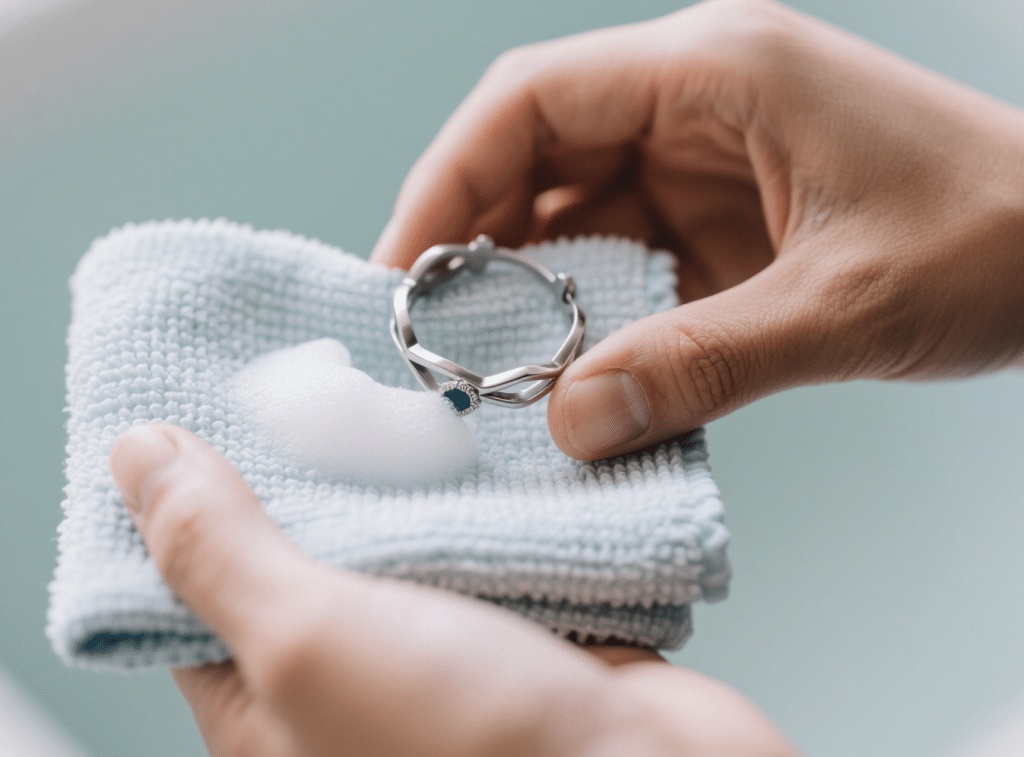
- Fill a bowl with warm water and a drop of mild dish soap.
- Allow your titanium ring or bracelet to soak for a few minutes.
- Wipe the piece with a soft, clean cloth.
- Gently scrub with a brush or sponge, rinse under warm running water, dry with soft towel.
You certainly don’t need anything flashy for your titanium jewellery. A soft toothbrush is great for getting into minor crevices, while avoiding coarse scouring pads that can damage the finish.
What Cleaners Are Safe?
You really can’t go wrong with basic dish soap and water. Strong chemicals, cleaners such as bleach and ammonia or jewelry cleaners designed for silver, will degrade the shine on titanium and/or cause a reaction.
Safety Tip: Always read the label of any product you use. When in doubt, wash with water and mild soap.
Storing Your Titanium Pieces
Store your titanium piece in a soft pouch or lined box. This prevents jewelry from crashing into each other and prevents scratches.
Moisture will cause darkening over time, so do keep them dry and store them away from damp locations.
Polishing Away Minor Scuffs
A microfiber or jewelry polishing cloth is gentle enough for everyday use on titanium. Rub the item with a cloth to restore the original brilliance.
No excessive polishing required, but a quick rub down every few months does the trick.
When Professional Help Is Needed
Profound scratches, dents, or broken settings on your titanium jewellery need skilled treatment. Professional jewelers, such as the expert craftsmen at HonHo Jewelry, can restore your titanium rings to their former glow and repair large damage with specialized tools.
Titanium vs. Other Jewelry Metals
Titanium is an exciting, new option in the jewelry market! It withstands heavy wear and stays looking brand new far longer than all other metals. It not only shimmers beautifully, but it provides a durable and easy-care alternative to more delicate metals for your daily pieces. Snatch this realistic choice for your everyday jewelry!
When you look at titanium next to metals like silver and gold, the differences show in real use: how each reacts to skin, how they hold up to knocks, and how much care they need.
Tarnish Resistance Showdown
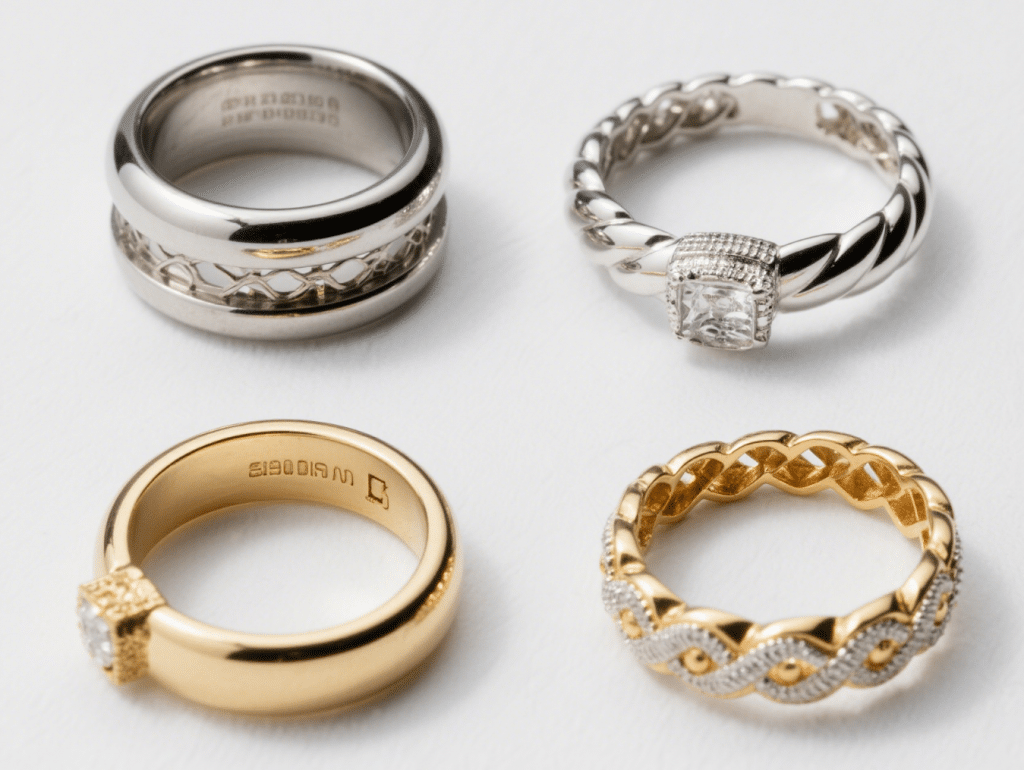
|
Metal |
Tarnish Resistance |
Upsides |
Drawbacks |
|---|---|---|---|
|
Titanium |
High |
No tarnish, low upkeep |
Harder to resize |
|
Silver |
Low |
Bright sheen, easy to shape |
Needs polishing |
|
Gold |
Medium |
Classic look, holds value |
Can lose shine |
What really makes titanium jewellery special is the thick oxide coat that naturally develops in air, providing excellent corrosion resistance and protecting it from rust and tarnish. In contrast, traditional jewelry materials like silver, which is soft and tarnishable, require frequent polishing to maintain their luster.
Durability and Scratching Comparison
Titanium wins against silver when it comes to daily wear and tear. Its hardness means rings and bracelets exhibit less noticeable scratching, even after decades of wear.
Silver, soft, washed and prone to tainting, picks up scratches and dents in the blink of an eye. Titanium’s strength makes it a great choice for anyone who would like their jewelry to hold up.
Weight and Comfort Differences
Titanium does not feel heavy, even in wider bands or large decorative pendants. This quality makes it perfect for people on the lookout for attention-grabbing designs with no burden of heavy steel.
For the same size, silver and gold are much heavier, which may become tiresome for extended wear.
Hypoallergenic Properties Compared
Titanium takes the cake for anyone with a metal allergy. Unlike metals such as nickel or cobalt, it is not known to be a frequent human skin irritant.
This alone makes titanium a great choice for body jewelry or anyone with sensitive skin.
Cost and Value Perspective
Titanium is more expensive than silver but delivers added longevity and minimal maintenance, making it a popular jewelry material. You spend a little more initially, but the titanium jewellery ages without losing its appearance, providing peace of mind and less maintenance eventually.
Is Titanium Jewelry a Good Choice?
Titanium jewelry is perfect for those seeking a unique look, combined with strength and comfort in everyday wear. If you use your hands often or participate in sports, titanium is the ideal material.
Titanium jewelry is perfect for people who seek a unique look, but strength and comfort in their everyday jewelry. If you’re someone who uses their hands to create or participates in sports, titanium makes an ideal ring. It can keep up with whatever your day throws at you — no problem!
It provides you with this incredible combination of ruggedness and wearability that really does appeal to so many different kinds of people. With so many of us seeking the balance of practicality and style, titanium meets those demands seamlessly.
Benefits of Choosing Titanium

When it comes to jewelry, titanium offers incredible advantages. This metal is really hard, so it holds up to impacts and falls better than anything else. For one, it doesn’t rust or corrode, so you can wash your hands or swim freely without a care.
The surface continues to look bright and clean, requiring very little, if any, polishing. Since titanium is made from completely hypoallergenic material, it’s ideal for women and men with metal allergies. You quickly come away with a durable ring or chain that won’t weigh heavily on you.
For best results, store your jewelry in a soft pouch or lined box to prevent scratches, and keep it dry to avoid darkening over time.
This durability makes it a style easy to wear day-to-day. For instance, if you want to wear your jewelry to the gym or in the shower, titanium works beautifully.
Potential Drawbacks to Consider
Here are a few things to consider. Engraving on titanium can be a challenge. If your goal is to achieve very detailed designs or to include a bunch of text, you’re going to run into problems.
Others prefer the appearance of gold or silver. While it’s true titanium is hard, that doesn’t mean it can’t chip, scratch or dent. Once made, resizing a titanium ring can be impossible or at least extremely difficult and costly.
Once shaped, titanium cannot be stretched or shrunk.
Ideal Lifestyles for Titanium Wearers
If you or that special someone are constantly on the go, titanium is the perfect match. Its light weight won’t weigh you down when you’re on the run, biking, or working with your hands.
Those who are allergic to nickel or other metals can wear titanium jewelry with confidence. The minimalist design pairs well with business attire and everyday looks alike. You’ll find it colorful, stylish, and you can wear it to just about any occasion.
My Personal Take on Titanium
Some believe titanium requires a lot of special care or that it’s inherently not as strong as gold. That’s just not true. Thriving under everyday use, titanium holds its shimmer with a simple cleaning.
It requires minimal care and can last a lifetime if looked after properly. When you understand the process, titanium proves to be an excellent choice for the average wearer.
Titanium Myths vs. Reality Check
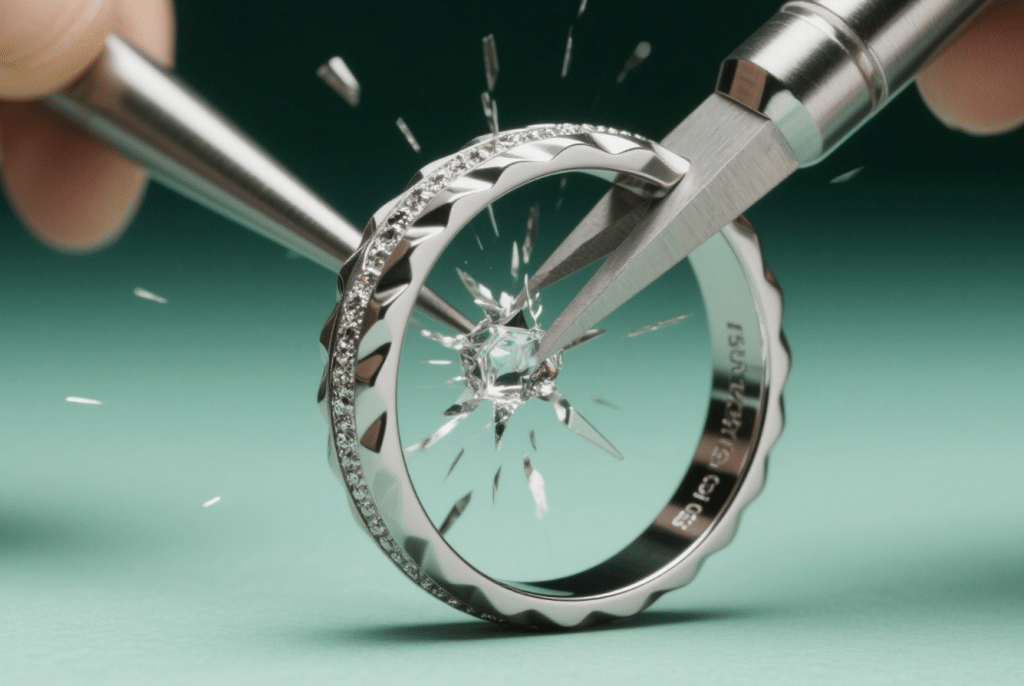
Many people assume that titanium is either too heavy or somewhat brittle for use in jewelry. That’s not how it works. Titanium is approximately 40% denser (heavier) than aluminum, but about 60% lighter than gold. You want a ring, a bracelet that feels comfortably right on the wrist or finger, not heavy or insubstantial-feeling.
Many others, however, believe it to be fragile. Titanium is harder wearing enough for everyday use than gold or silver can’t even dream of. Its reputable strength and toughness has contributed to its durability. Its lightweight guarantees comfort and chic in equal measure to those who desire them both.
Titanium never tarnishes or corrodes. This is owed to its ability to spontaneously form a protective, thin oxide film in the atmosphere. This layer protects titanium from the elements, preventing corrosion.
Sterling silver, by comparison, tends to react to things in the air, or even to your skin and will turn dull or black. Titanium simply doesn’t corrode. If you do happen to scratch it, it is possible to buff it out. The oxide layer will return the moment it touches air, so the shiny finish lasts.
Debunking Common Misconceptions
Titanium is indestructible. Some people believe titanium is unbreakable. It’s definitely hard, but not impregnable. If you bang it up or rub it along a rock, it’ll scratch or dent.
Having said that, it’s less prone to aging than gold or silver. Daily care goes a long way. Simply wiping it down or polishing it up will ensure the surface stays looking new and vibrant. Only under very extreme conditions are unusual markings, such as with extreme chemicals or temperatures above 1,100°F, ever witnessed. These accidents are hardly the standard of modern life.
Understanding True Durability Limits
Titanium performs well in a variety of environments, but it’s helpful to understand what you may encounter. Activities such as playing in sand, grit, or heavy industrial work may cause scratches.
Daily maintenance with a good dusting and occasional wash and polish can do wonders to maintain the gorgeous exterior. The titanium oxide layer insures it will not rust or turn green, however clean hands and proper storage keep it performing at its best.
Setting Realistic Expectations
HonHoJewelry puts a lot of thought into what their titanium jewelry looks like in real life. With some basic care, your titanium ring or chain will stay sharp for years—no special upkeep required.
Conclusion
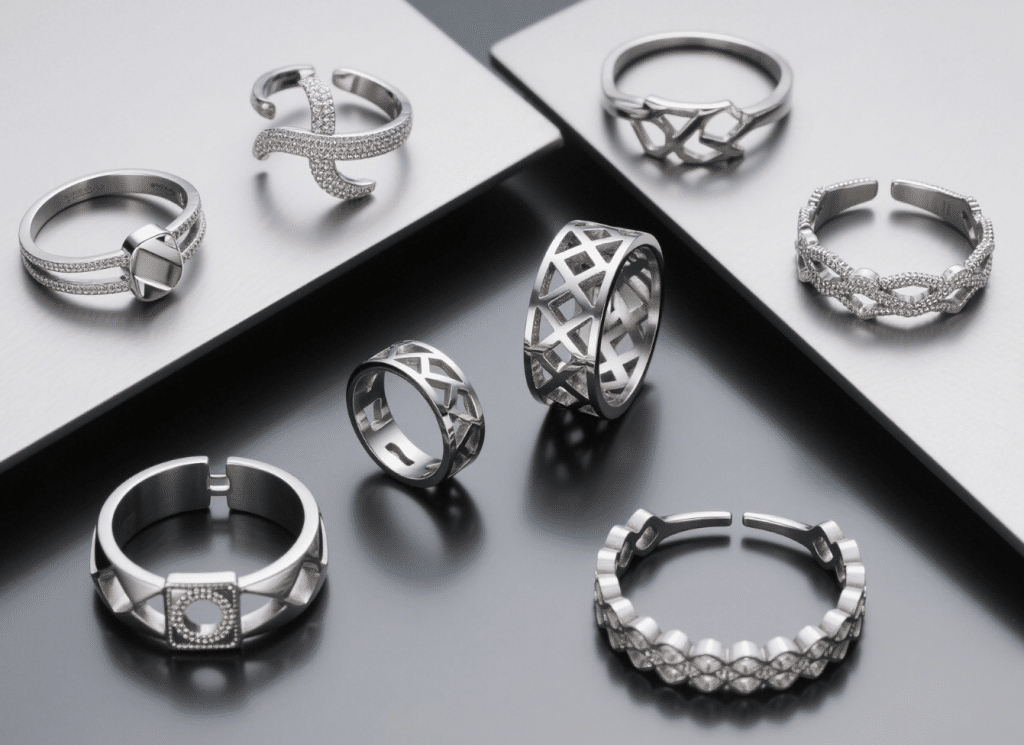
Titanium stays true to its cutting edge aesthetic. Unlike silver or copper, sweat, soap and the occasional nicks and bumps from daily wear do not dull it. No green streaks, no decay, no problem. You end up with a flexible metal that can keep up with your go go go days and homebody evenings. Just wash it with a little dish soap and a soft cloth, and it’s bright and beautiful.
Whether you wear it in the pool or on the job, it still has the same great durability and appearance. That’s why so many consider titanium to be an intelligent investment when it comes to permanent rings and chains and studs. You know it’s a perfect fit for anyone who prefers fashionable elegance without the fuss. There’s no better time than fall to enhance your jewelry style. Sample some titanium today for a beautiful new look with less maintenance!
Frequently Asked Questions
Does titanium jewelry tarnish over time?
Titanium jewelry doesn’t tarnish like silver or copper, thanks to its great material properties. This process forms a natural oxide layer that maintains the jewelry’s shine and corrosion resistance, making it a durable option for long-lasting titanium rings.
Can titanium jewelry turn your skin green?
No, titanium jewelry is hypoallergenic and rarely reacts with skin, making it a durable option that won’t tarnish or leave a green mark like other metals.
No, titanium jewelry is hypoallergenic and rarely reacts with skin, making it a durable option that won’t tarnish or leave a green mark like other metals.
How should I clean my titanium jewelry?
Cleaning your titanium jewellery is easy too—just use mild soap, warm water, and a soft cloth. Keeping it away from strong solvents or abrasive cleaning products will ensure your titanium pieces remain in optimal condition without risk of deterioration.
Cleaning your titanium jewelry is easy. Just use mild soap, warm water, and a soft cloth. Keeping it away from strong solvents or abrasive cleaning products will ensure your pieces remain in optimal condition without risk of deterioration.
Yes, titanium jewelry is extremely durable and boasts impressive corrosion resistance; it does not rust or tarnish, making it a great material for day-to-day wear. This popular jewelry material is just as comfortable during yoga or sports as it is at an elegant event.
How does titanium compare to silver and gold for tarnish resistance?
Unlike silver and gold, titanium jewellery is extremely tarnish resistant. While silver will eventually tarnish and gold will lose its luster over time, a pure titanium ring is simple to maintain and retains its rich color and shine indefinitely.
What can affect the appearance of titanium jewelry?
Abrasion or exposure to chlorine, saltwater, or other harsh chemicals can dull the finish of titanium jewellery. Although this may lead to everyday wear and tear, it does not result in tarnish, making titanium rings an easy-to-maintain choice.
Is titanium jewelry a good choice for sensitive skin?
Not at all – I’d love to help! Titanium jewelry, known for its corrosion resistance and hypoallergenic properties, is completely nickel free, making it a safe and reliable alternative for those with sensitivities to traditional jewelry materials.
share this recipe:
Still hungry? Here’s more

Custom Engraved Jewelry Wholesale: Adding a Personal Touch
In today’s competitive retail market, standing out is everything. Consumers are no longer just buying
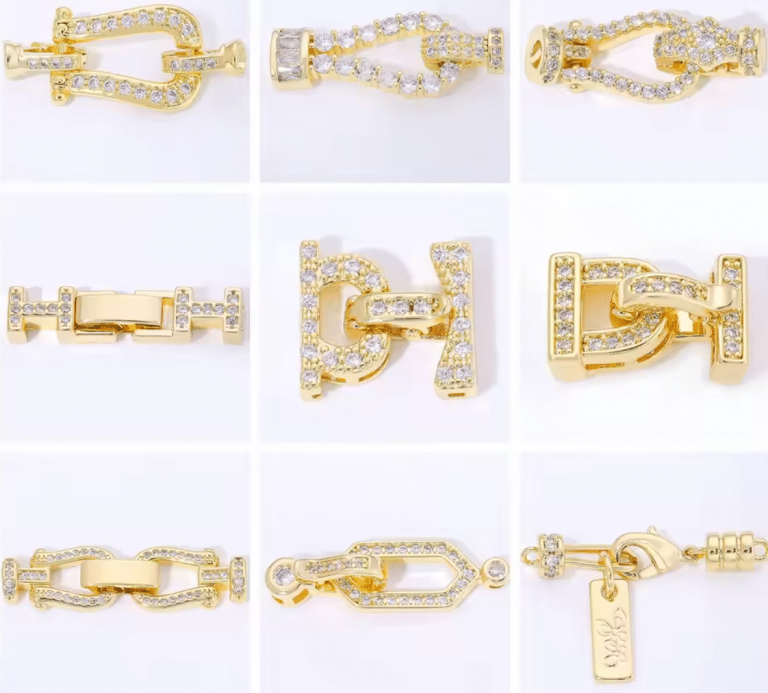
Choosing the Right Jewelry Clasp for Custom Designs
Introduction When designing custom jewelry, the clasp is often the unsung hero – it’s the
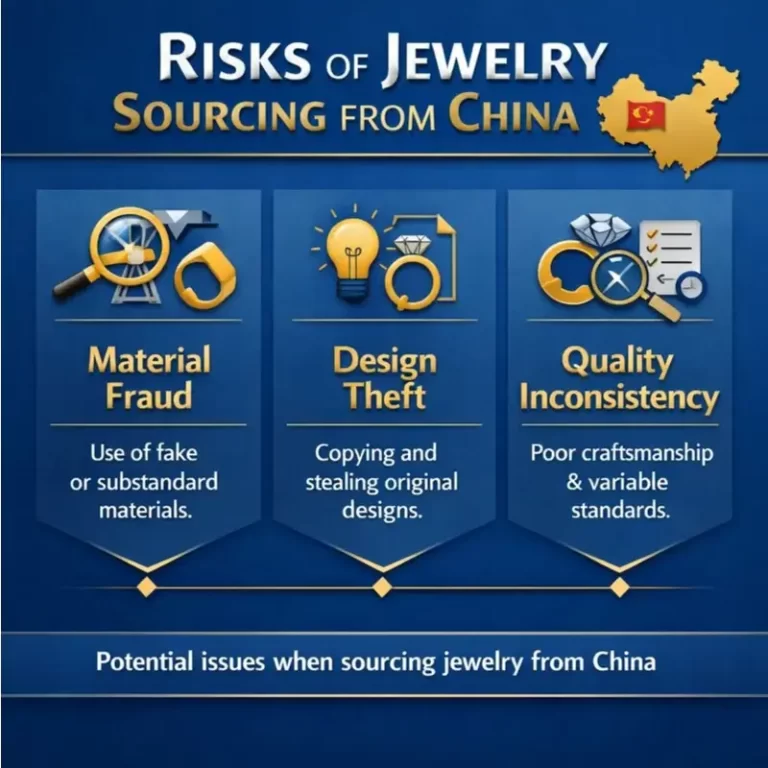
How to Dodge Jewelry Sourcing Risks from China: Your 2026 Playbook
The allure of jewelry sourcing from China is undeniable. It’s a global hub of manufacturing,
Ready to Design Your Own Jewelry?
Have an idea in mind or need help shaping it? From sketches to finished pieces, our custom jewelry team will work with you step-by-step to bring your vision to life.



